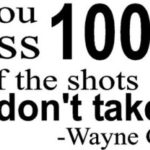Surprise! That free talk over lunch on financial freedom you signed up for started with networking 20 minutes before the talk was supposed to start and you arrived just in time to hear the hostess greet everyone with the ubiquitous, “If everyone could grab a seat, we’ll get started.”
Dang.
As you look around, you realize that there are people in attendance from whom you really could have learned something. This was truly a missed opportunity.
This has happened to me more than once. How about you? Sorry to hear it.
Take heart, merry networker. There is a solution: Know thy event.
It took me a while (short while) to realize there were different types of events and, hence, different opportunities to connect with others. It, unfortunately, took me a wile longer to do something about it. Both of these statements deserve attention.
First, the different types of events.
The biggest difference with events is whether networking is a part of the agenda or not. Here is a breakdown of the formats of the types of events I’ve encountered.
Seminar/talk, informal networking before.
This was the type of event that was most frustrating to me. I would sign up for an educational talk I was interested in and arrive just in time to hear the presentation begin, not realizing there was an opportunity to meet people beforehand. At these situations most events have time allotted before the formal presentation for attendees to mix and meet one another and, more importantly, meet the presenters and their Associates. This is actually a key point. This is a way that we can target our networking to industry-specific people. If you are looking to meet, let’s say, folks in the legal profession, you could attend a talk on an interesting topic being hosted by a law firm you’d like to get to know. This could be used for objectives such as finding work or looking to meet potential clients or simply meeting people within an Industry.
Program with informal networking.
This type of event is primarily scheduled to share information, however, organizers will provide leave opportunities for attendees to meet each other even though it’s not explicitly part of the agenda. Great examples of this type of event would be the networking that happens before such things as rotary meetings, Chambers of Commerce business tours, or economic development organizations monthly meetings. The Chamber of Commerce I belong to hosts a trolley tour of local businesses periodically. During the trolley drive time informal networking is common (if not expected), but when businesses are reached focus is shifted to the tour that’s being provided.
Program with formal networking.
Another type of event that is less common is one where there is a formal program and agenda and networking is part of the agenda. An association I belong to cause this forced networking. These types of events are less common, and are identified by having networking right on the agenda as part of the event for a limited time. Examples of this would be the association I mentioned actually assigns numbers to attendees and breaks them up based on those numbers so that there is some randomization to who is met yet there is a guarantee you will be meeting people and talking to them. These types of events are great for those of us who tend to be more shy and need help making or figuring out when the right time to introduce yourself would be because the organizers tell you to begin.
No program, formal networking.
These types of programs are designed to make it very easy to meet other people. The whole agenda is deliberately meeting others in some organized fashion. A great example of this is speed networking where attendees are assigned seats and given time limits to speak to one another and then move to the next person. Although these seem to be less common they have their merits and are a fabulous way to grow your network very quickly.
No program, informal networking
These events are No-Holds-Barred, open-format, you-are-on-your-own types of events. These are the events where you walk in, are given a name badge, and pointed in the right direction. After that it’s up to you to make the introductions and meet other people. Of the many conversations I have had with other folks about networking, these are the events that tend to make people nervous because our own social skills determine whether we sink or swim in the environment. However, these can also be great opportunities to meet a huge variety of people. Probably the biggest deals with these events is whether or not there is food and drink available and whether or not there is a cost to get in or for the refreshments. This can be quite the problem if you are someone like me who doesn’t carry cash with you.
Informal networking, informal program.
These are the events that caught me off-guard more than once. The event is promoted as an informal after-business-hours type of event but lo and behold, 30 minutes into the event the organizer asks for everyone’s attention and begins extending thank-yous, introducing other people, make an impromptu presentation, or even draw names for free giveaways. The problem with these is that if you have in mind to use the entire time for networking and show up 30 minutes into the event, you’ve just missed out on networking because you’ve arrived just in time for 20 minutes of listening to someone else talk. Not too productive from a networking perspective.
Combination.
There are also combinations of these formats. For example, the monthly meeting for the Middleton Chamber of Commerce here in Wisconsin invites attendees to arrive 30 minutes early for informal networking, then has formal networking within small groups right on the agenda, then again, invites attendees to stick around for 15 minutes after the program to informally network again.
So why worry about what type of event you’re going to? Because of why you’re doing all this. Just winging it (like I did until I learned better) will likely not get you where you want to go. You are attending the event to meet people, right? If you don’t use that opportunity for its purpose, why are you going?
This means you need to be deliberate about your time and planning. If you are going to an event to meet people it makes sense to make the most of it. Especially if you’re someone like me who only attends a few events a month when events are attended I want to make sure I accomplished actually meeting people. That’s hard to do if I arrive after networking time.
Sure, this is easy if you are attending the same events over and over since you’ll know the format, and that is great. However if you are branching out and attending different events please take the time to know what you are in for.
If you can’t gather information about an event from the event website orother people in your network, don’t be afraid to call or contact the organizer to ask about the format. They will be quite happy to chat with you in most cases since many times they are deliberately organizing the event for exposure of their organization and networking.
I hope this information is helpful. Sometimes it may feel a bit awkward to do this type of homework in advance when Pop Culture tends to portray networking as something we just show up and do rather than prepare for.









